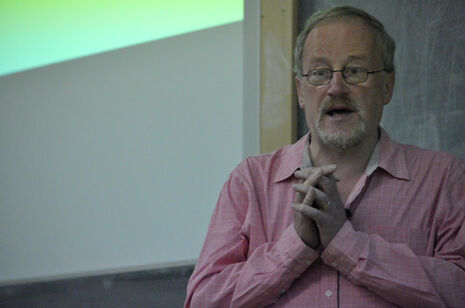Concern over GCHQ interference
Prof Ross Anderson has outlined his belief that £50,000 studentship offered by GCHQ could threaten independence of research

Links between Cambridge’s Department of Computer Science and GCHQ threaten its academic independence, according to Professor Ross Anderson, the University’s head of cryptography.
The Department was recently awarded the status of Academic Centre of Excellence in Cyber Security (ACECSR) by GCHQ, making available £50,000 for a PhD studentship.
In an interview with Varsity, Anderson outlined his belief that the arrangement threatens the Haldane principle, which asserts the independence of research grant awarding bodies in deciding which projects to fund. The problem is that the University and GCHQ have fundamentally different purposes, he says.
Although the PhD studentship has not yet been taken up by anyone in the Department, Anderson is concerned that GCHQ will be able to direct research in security, and that the large sums of money that are supposed to be available on a non-discriminatory basis will only be available to ACECSRs.
He describes how security clearance is used by the intelligence organisation as a means of insisting on the right of prior review of all publications: “They will tell you some irrelevant and harmless top-secret fact and they will then say since this person has had access to top secret information, we need to be able to review their research for the rest of their life.
“The object of the exercise is to rein in and control security research done in British universities.”
He added: “After putting a relatively small amount of money into the system GCHQ has effectively wrested control over millions of pounds of public money that used to be spent on doing security research and is now being handed out to people who have signed up to the GCHQ programme.”
A spokesman for GCHQ said: “GCHQ recognises the critical role the UK academic sector plays in both national security and prosperity.
“We are working with partners across government and beyond to rec- ognise and increase the investment in those universities that demonstrate excellence in cyber security. Cambridge University has some of the UK’s leading thinkers in the field and we welcome the challenge and independence they and their colleagues across the sector bring.”
Any applicant has to obtain vetting clearance from GCHQ, including the requirement not only to have been born in Britain, but for their father to be British-born as well. Anderson suggested this was “an ingenious way of getting around the laws against racial discrimination and that the “majority of our research students are foreign”.
 News / Eight Cambridge researchers awarded €17m in ERC research grants27 December 2025
News / Eight Cambridge researchers awarded €17m in ERC research grants27 December 2025 News / News in Brief: carols, card games, and canine calamities28 December 2025
News / News in Brief: carols, card games, and canine calamities28 December 2025 News / Caius mourns its tree-mendous loss23 December 2025
News / Caius mourns its tree-mendous loss23 December 2025 News / Clare Hall spent over £500k opposing busway 24 December 2025
News / Clare Hall spent over £500k opposing busway 24 December 2025 Interviews / Meet Juan Michel, Cambridge’s multilingual musician29 December 2025
Interviews / Meet Juan Michel, Cambridge’s multilingual musician29 December 2025









